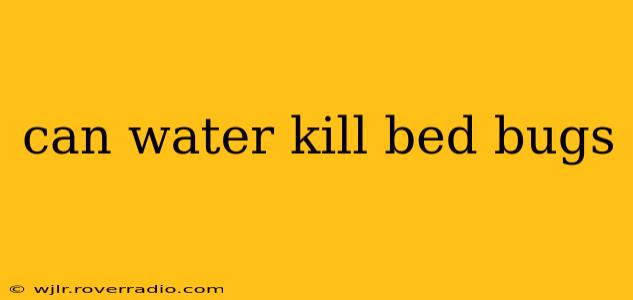Can Water Kill Bed Bugs? The Truth About Drowning These Pests
Bed bugs are tiny, resilient insects that can cause significant discomfort and sleepless nights. While many methods exist to combat these pests, a common question arises: can water kill bed bugs? The short answer is: it depends. While water alone isn't a reliable method for complete bed bug eradication, it can play a role in a larger pest control strategy.
This article will delve into the effectiveness of water in killing bed bugs, exploring various methods and addressing common concerns.
Can submerging bed bugs in water kill them?
Yes, submerging bed bugs in water for an extended period can kill them. However, this isn't as simple as it sounds. Adult bed bugs can survive for a surprisingly long time underwater, potentially even days depending on the water temperature and the bug's condition. Nymphs (young bed bugs) might be more susceptible to drowning.
The problem is that bed bugs are incredibly small, and finding and submerging every single one in your home—including eggs, which are even more resilient—is practically impossible. This makes complete eradication through submersion highly improbable.
Will washing bedding in hot water kill bed bugs?
Washing bedding, clothing, and other infested items in hot water is a crucial part of a comprehensive bed bug control plan. Hot water, at a temperature of at least 120°F (49°C), can kill bed bugs and their eggs. It's essential to ensure the water reaches this temperature and that items remain submerged for at least 30 minutes to guarantee effective eradication. Check your washing machine's manual to ensure it can reach this high temperature. After washing, immediately dry the items on high heat for at least 30 minutes to completely eliminate any surviving bed bugs.
Can steam kill bed bugs?
Steam cleaning is a highly effective method for killing bed bugs. The high-temperature steam penetrates fabrics and crevices, killing both adult bed bugs and eggs. Professional steam cleaning services utilize industrial-strength steam cleaners capable of reaching temperatures high enough to ensure complete eradication. However, it's crucial to note that steam cleaning may not reach every nook and cranny, and for best results it should be part of a broader pest control strategy.
What are the limitations of using water to kill bed bugs?
The biggest limitation of using water alone to kill bed bugs is its inefficiency in treating infestations. Bed bugs hide in cracks and crevices, making it difficult to reach them with water. Moreover, water doesn't eliminate eggs effectively. Eggs are highly resistant and can survive even after being submerged or exposed to hot water for shorter periods. Therefore, water should be considered a supplemental tool, not a standalone solution.
What is the best way to get rid of bed bugs?
While water can play a supporting role, a multi-pronged approach is necessary for effective bed bug eradication. This often involves:
- Thorough cleaning: Vacuuming and washing all bedding, clothing, and other infested items in hot water.
- Heat treatment: Employing professional heat treatments to raise the temperature in infested areas, killing bed bugs and their eggs.
- Pesticide application: Using targeted pesticides to eliminate remaining bed bugs.
- Professional inspection: Calling a professional pest control company for an inspection and treatment plan.
In conclusion, while water, particularly hot water, can kill bed bugs under specific circumstances, it’s not a reliable method for complete extermination. It's a valuable component of a comprehensive bed bug control strategy, but relying solely on water to eliminate these pests is highly unlikely to succeed. A professional pest control service is often necessary to handle a full-blown infestation effectively and safely.
